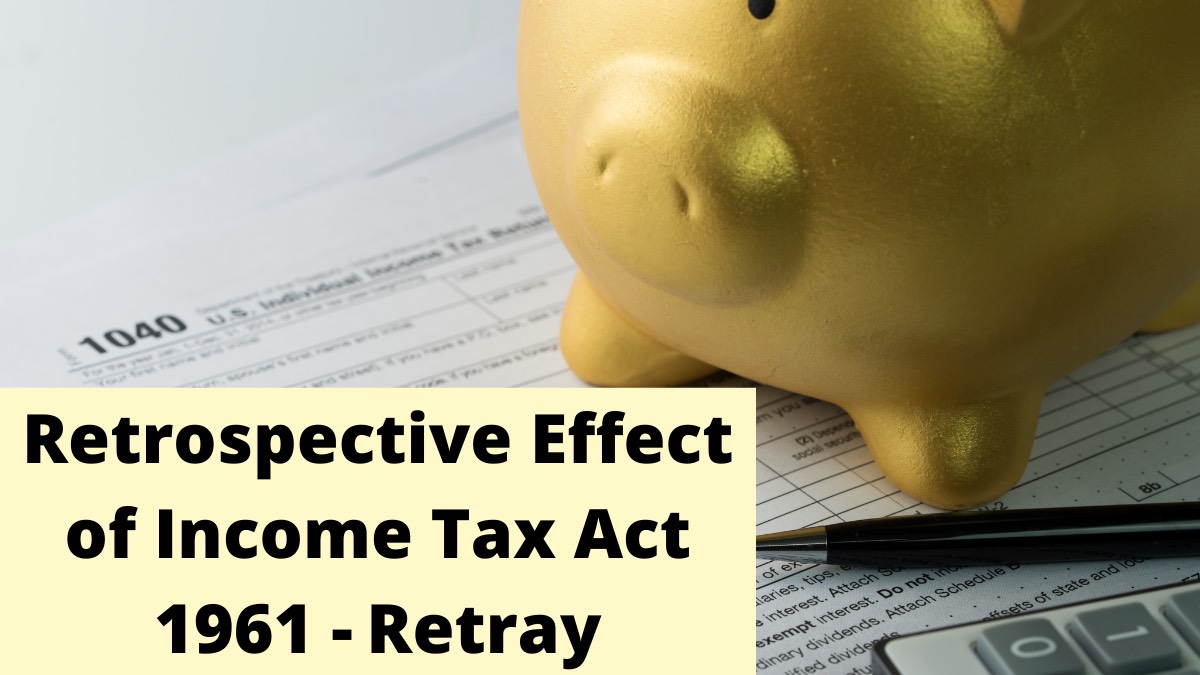Retrospective Effect of Income Tax Act 1961: In the year 2012, the Government of India has amended the Income Tax Act 1961 for the First time with effect from 1st April 1962.
The background that led to making a retrospective of the effect of the amendment to the Income Tax Act 1961 is because of demand made by the Income Tax Department on Vodafone International Limited.
The company purchased the stake in Hutchison Telecommunications, Hong Kong through the purchase of shares resulting in the transfer of right to business in operating the telecommunication service in India.
The transactions are made between two non-resident Companies involving huge payments by Vodafone to Hutchinson.
Advertisement
As a result of the transactions, the Income Tax Department issued notice to Vodafone International Holdings under Sections 201 and 201 (1A) of the Income Tax Act for non-deduction of tax at source on the $11.2 billion transactions for payment of Rs 11,218 cr and Rs 7,900 crores penalty was imposed. for non-deduction of tax under section 195 of the Income Tax Act 1961.
After losing the case against the company in Supreme Court, the Government of India (Ministry of Finance) amended Section 9 of Income-tax Act, 1961 vide Finance Act 2012 and provided that shares or interest in any foreign company/entity shall be deemed to be situated in India if such shares or interest derives its substantial value from assets located in India.
Retrospective Effect of Income Tax Act 1961
Under Section 45 of the Income Tax Act 1961, any capital gain from the transfer of such shares or interest in a foreign company deriving its substantial value from assets located in India was brought under the tax levy
The government did not stop at this amendment of the new levy but made it effective retrospective from 1st April 1962. This would mean the Vodafone case where entire transactions were already carried out and the ruling was also pronounced by Supreme Court could be brought to tax with this retrospective amendment.
Similary, in 2007, Cairn UK transferred shares of Cairn India Holdings to Cairn India on which Income Tax authorities slapped a tax demand of Rs 24,500 crore as it contended that Cairn UK had made capital gains. Cairn refused to pay taxes and challenged India’s stand at an arbitration court.
Whether the transfer of shares between two foreign companies, resulting in extinguishment of controlling interest in the Indian Company held by a foreign company, amounted to transfer of capital assets in India and whether such transaction is chargeable to tax in India?
The government of India (Ministry of Finance) amended Section 9 of Income-tax Act, 1961 vide Finance Act 2012 and provided that shares or interest in any foreign company/entity shall be deemed to be situated in India if such shares or interest derives its substantial value from assets located in India.
Any capital gain from transfer of such shares or interest in foreign company deriving its substantial value from assets located in India was brought under tax levy. The government did not stop at this amendment of new levy but made it an effective retrospective from 1962. This would mean the Vodafone case where entire transactions were already carried out and ruling was also pronounced by Supreme Court could be brought to tax with this retrospective amendment.
In view of the above, the Government amended Section 9(1) and Section 45 of the Income Tax Act 1961 with effect from 1st April 1962 through Finance Act 2012.
Provisions of Income Tax Act 1961 involving retrospective amendment are, viz.,
- Sec 2(14) of Income Tax Act-Capital Asset
- Sec 2(24) of Income Tax Act- Definition of Income
- Sec 5 of Income Tax Act-Scope of total income
- Sec 9 of Income Tax Act- Income deemed to accrue or arise in India
- Sec 45 of Income Tax Act-Capital gains
- Sec 191 of Income Tax Act-Direct Payment
- Sec 195 of Income Tax Act
- Sec 201 of Income Tax Act-Consequences of failure to deduct or pay
Both Cairn and Vodafone challenged the demand under bilateral investment treaties India has with UK and the Netherlands, and they both got favourable rulings recently.
The retrospective taxation continued to be a sore point and hence the government has voluntarily decided to bring in this bill to nullify all retro tax demands.
A total of Rs 8,100 crore was collected using the retrospective tax legislation. Of this, Rs 7,900 crore was from Cairn Energy alone.
In addition to the above two land mark cases, there are seventeen cases with the government where income-tax demand has been raised.
In a bid to close the long pending issues, the Government has introduced Taxation Laws (Amendment) Bill, 2021’ in the LokSabha that seeks to withdraw tax demands made using a 2012 retrospective legislation on indirect transfer of Indian assets prior to May 28, 2012.
The move comes as Cairn Energy is threatening to confiscate overseas Indian assets following an international arbitration tribunal order in its favour.
As a result of the above amendment, the government also decided to refund the amount collected from the companies without interest.
Also check CA Final Result, CA Inter Result and CA Foundation Result

